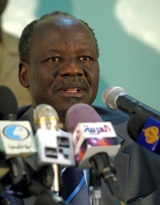Sudan’s FM slams Darfur campaigns
October 3, 2007 (UNITED NATIONS) — Sudan’s foreign minister on Wednesday urged all rebel groups to join the upcoming peace talks on Darfur and called Western campaigns to aid Darfur “vicious,” hostile and unfair.

But he said Sudan had been the target of “hostile, ill-intentional campaigns” from abroad aimed at exploiting the crisis in Darfur to serve their “well-known agendas and plans,” an obvious reference to Western advocacy groups criticizing Sudanese army actions in Darfur.
“This vicious campaign targeted the policies of the country and its stance, and has strived to exaggerate and distort facts and to violate the country’s capabilities and the heritage and values of its people,” Akol said.
The minister urged Darfur’s myriad rebel groups to stop warfare and join the “peace march without delay.” He called on the international community to take “firm measures” against those who refuse to participate or obstruct the talks.
Akol, however, did not mention the rebel attack in South Darfur on Saturday that killed 10 African Union peacekeepers and wounded 10 others.
The underequipped and underfinanced AU force of 7,000 from 26 countries in Darfur will be absorbed into a joint AU-United Nations force of up to 26,000 troops and police.
Four years of warfare, disease and hunger have caused an estimated 200,000 deaths and uprooted more than 2.5 million people from their homes, many having fled to arid camps.
Sudan had equipped Janjaweed Arab militia, who tortured civilians, to put down a revolt by tribesmen in 2003. In the past year rebels have split into various factions and joined the abuse.
But despite continued violence, Akol said, the humanitarian situation had improved and there were no epidemics, hunger or food shortages, according to government indicators.
A former rebel from southern Sudan, Akol contended all agreements on power-sharing had been implemented in the south or would be carried out shortly under a 2005 agreement that ended a 21-year old civil war.
In August, however, U.N. Secretary-General Ban Ki-moon reported that the Sudanese military had not removed some 3,600 troops from the south as promised and said a joint military units between the government and the former rebels was far behind schedule.
Akol also reminded rich countries that they had promised reconstruction aid after the 2005 north-south agreement at an Oslo conference the same year.
This included debt cancellation and the lifting of unilateral economic sanctions, among other measures.
The failure to deliver “in effect defeats the very objectives of the Comprehensive Peace Agreement itself, so that the country is able to face the burden of reconstruction and development,” Akol said.
(Reuters)
